|
|
|
Sort Order |
|
|
|
Items / Page
|
|
|
|
|
|
|
| Srl | Item |
| 1 |
ID:
105922
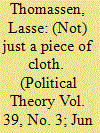

|
|
|
|
|
| Publication |
2011.
|
| Summary/Abstract |
To understand the politics of recognition, one must conceive of it as a politics of representation. Like representation, recognition proceeds at once in a constative and a performative mode, whereby they bring into being what is simultaneously represented or recognized. This structure has paradoxical implications. The politics of recognition is also a politics of representation in the sense that it always involves questions such as, Which representations are recognized? Whose representations are they? The reverse is also true: the politics of representation involves recognition because representatives and representations must be recognized in order to gain authority. In short, we can examine recognition as representation, and there is no recognition without representation, and vice versa. This is demonstrated through a reading of a recent British legal case, Begum, where the issue at stake concerned which representation of Islam should form the basis for the recognition of Islam in the school uniform policy.
|
|
|
|
|
|
|
|
|
|
|
|
|
|
|
|
| 2 |
ID:
105923
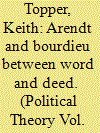

|
|
|
|
|
| Publication |
2011.
|
| Summary/Abstract |
This essay investigates questions about the relationship between language, speech, and democratic institutions by bringing into conversation Hannah Arendt's and Pierre Bourdieu's distinctive views of the politics of language and speech. First, I explicate Arendt's account of the connection between speech, action, and identity disclosure, as well as its role in her broad conception of political institutions. Next, I complicate this outlook by examining Bourdieu's political sociology of language, focusing on the ways that linguistic competences valorized in particular institutional settings operate as mechanisms of silencing, domination, and exclusion. Finally, I bring these approaches together by investigating political events-AIDS activism in the United States during the 1980s and early 1990s-that raise critical issues regarding the politics of language and speech within a specific institutional setting. By reading Arendt and Bourdieu together in the context of these events, one can develop a defensible account of the politics of speech in democratic theory and practice.
|
|
|
|
|
|
|
|
|
|
|
|
|
|
|
|
| 3 |
ID:
105921
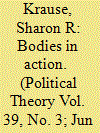

|
|
|
|
|
| Publication |
2011.
|
| Summary/Abstract |
A better appreciation of the material, distributed quality of human agency can illuminate subtle dynamics of domination and oppression and reveal resources for potentially liberatory political action. Materialist accounts of agency nevertheless pose challenges to the notion of personal responsibility that is so crucial to political obligation and democratic citizenship. To guard against this danger, we need to sustain the close connection between agency and a sense of selfhood that is individuated, reflexive, and responsive to norms. Yet we should acknowledge that reflexive selfhood is not the whole of individual agency for the sources of agency extend beyond the individual herself. We also need to recognize the ways that both reflexivity and norm-responsiveness are themselves embodied capacities. When properly conceived, a materialist view of agency can increase awareness of our often-unwitting contributions to systematic inequalities of power and extend our political responsibilities in emancipatory directions, thus holding great promise for democratic
|
|
|
|
|
|
|
|
|
|
|
|
|
|
|
|
| 4 |
ID:
103754
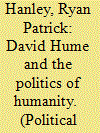

|
|
|
|
|
| Publication |
2011.
|
| Summary/Abstract |
Recently a call has gone up for a revival of the "politics of humanity." But what exactly is the "politics of humanity"? For illumination this paper turns to Hume's analysis of humanity's foundational role in morality and modern politics. Its aims in so doing are twofold. First, it aims to set forth a new understanding of the unity of Hume's practical and epistemological projects in developing his justifications for and the implications of his remarkable and underappreciated claim that humanity is the only sentiment on which a moral system can be founded. Second, by attending to Hume's substantive definition of humanity and its relationship to benevolence and sympathy in particular, it aims to clarify the relationship between the principal elements of the politics of humanity: "humanism" or secularism, "humane" or other-directed values, and mutual recognition of our shared "humanness."
|
|
|
|
|
|
|
|
|
|
|
|
|
|
|
|
| 5 |
ID:
103755
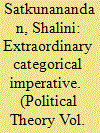

|
|
|
|
|
| Publication |
2011.
|
| Summary/Abstract |
Many political theorists assume that Kant's categorical imperative can only present itself to politics epistemologically-that is, as a test or procedure for acquiring more certain knowledge of duties. This study retrieves the ontological aspect of the categorical imperative by showing that the Groundwork of the Metaphysic of Morals is a conversion narrative. In the Groundwork Kant describes a transformative encounter with the categorical imperative as a principle that discloses our (ordinarily concealed) ontological condition. This encounter opens a new mode of being characterized by the feeling of awe. In its ontological aspect, the categorical imperative discloses human freedom and demands an unflagging thoughtfulness, but offers no material guidance about duties. When understood in both its ontological and epistemological aspects, the categorical imperative offers a rich portrait of human responsibility and can help illuminate the ethical stance appropriate to politics without becoming a standard to be imposed upon politics.
|
|
|
|
|
|
|
|
|
|
|
|
|
|
|
|
| 6 |
ID:
103753
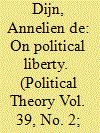

|
|
|
|
|
| Publication |
2011.
|
| Summary/Abstract |
This essay draws attention to the importance of Montesquieu's earliest and unpublished writings on liberty for our understanding of the famous eleventh book of the Spirit of the Laws. Montesquieu's investigation of the nature and preconditions of liberty, the author argues, was much more polemical than it is usually assumed. As an analysis of his notebooks shows, Montesquieu set out to wrest control over the concept of liberty from the republican admirers of classical antiquity, a faction that he believed to be dangerously populist and revolutionary. In order to do so, Montesquieu came up with a redefinition of the concept of liberty that allowed him to argue that monarchical subjects could be just as free as republican citizens. This conclusion has important implications not just for our understanding of Montesquieu's writings but also and more broadly for our understanding of the intellectual history of liberalism.
|
|
|
|
|
|
|
|
|
|
|
|
|
|
|
|
|
|
|
|
|